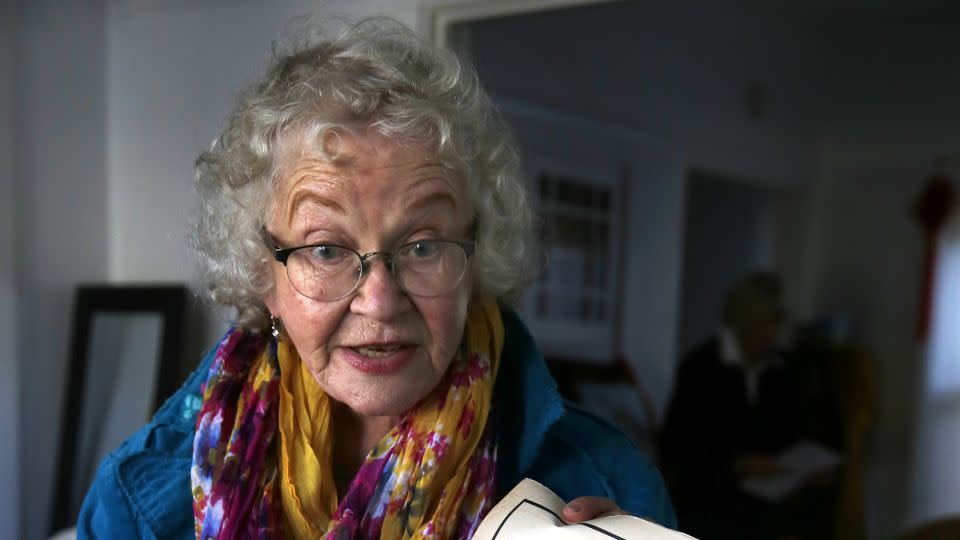Opinion: She was immortalized by Joni Mitchell - and if you love comics, she touched your life
Editor’s Note: Roy Schwartz is a pop culture historian and critic. Follow him on Twitter, Instagram and Facebook and at royschwartz.com. The views expressed here are his own. View more opinion at CNN.
Traveling between New York and Los Angeles in the 1960s, Trina Robbins hobnobbed with rock stars like Jim Morrison and Joni Mitchell, who even sang about her in “Ladies of the Canyon.” “Trina takes her paints and her threads/And she weaves a pattern all her own,” sang Mitchell.

Robbins, arguably the most influential female comic book artist in history, died on April 10 in San Francisco following a stroke, at age 85. As a groundbreaking artist, writer, editor and activist, she helped reshape comics into a more inclusive place for women, as well as other underrepresented voices.
Together with Art Spiegelman, Harvey Pekar and Robert Crumb (with whom she would clash) she helped redefine what comics could be, as well as by and for whom. Born in Brooklyn in 1938 to Jewish immigrants from Belarus and raised in Queens, Robbins grew up reading comics but drawing fashion. By her mid-twenties she’d found success as a dress designer, opening her own boutique in the trendy East Village in 1966.
Robbins started dabbling in comics around 1969, creating a handful of strips for the newspaper “The East Village Other,” as well as designing the iconic costume for the horror-camp heroine Vampirella for Warren Publishing.
It wasn’t until she moved to San Francisco in 1970 that she became a dedicated comic book artist. She joined the burgeoning underground “comix” scene, which eschewed superheroes in favor of real-world topics like sex, drugs, racial and economic inequality, systematic injustice, urban decay, environmentalism and politics.
But comics were a boy’s club, an industry that had always been male-dominated and by the 1960s had become male-oriented (this wasn’t always the case), even in the indies. So together with cartoonist Barbara “Willy” Mendes, in July 1970 Robbins published “It Ain’t Me, Babe,” a one-shot anthology that was the first comic completely made by women. The cover read “womens liberation,” above a protest march of comic icons like Olive Oyl, Wonder Woman, Mary Marvel and Little Lulu.

It reportedly sold 40,000 copies, a massive hit for an independently produced comic. With the publisher’s encouragement, Robbins then co-created “Wimmen’s Comix” in 1972, the first comic book series edited, written and drawn entirely by women. Published more or less annually, it was also the longest running, lasting until 1992.
Unflinchingly feminist, the series included landmarks like “Sandy Comes Out,” the first explicitly lesbian story in comics.
In 1986, Robbins made the jump to mainstream comics, becoming the first woman to draw Wonder Woman in her own comic — amazingly, more than four decades since the character’s creation.
Yet, for all her success, it wasn’t enough. Robbins wanted recognition for the female cartoonists who came before, but were overlooked by an industry focused on honoring male artists like Charles Schulz and Jack Kirby.
She started researching and writing, co-writing or editing books including: “Women and the Comics” (1985), “A Century of Women Cartoonists” (1993), “The Great Women Superheroes” (1996), “From Girls to Grrrlz: A History of Women’s Comics from Teens to Zines” (1999), “The Great Women Cartoonists” (2001), “Pretty in Ink” (2013), “Flapper Queens: Women Cartoonists of the Jazz Age” (2020) and “Dauntless Dames: High-Heeled Heroes of the Comic Strips” (2023), becoming an influential historian of the field.
She was also a pioneer of Jewish representation in comics. While largely created by Jews, the industry tended to avoid explicitly Jewish subject matter until the 1970s, when Robbins and other underground creators produced autobiographical and cultural works. “I don’t know if it’s in the genes, I don’t know if it’s the heritage, but there’s a thing about Jews and communication,” she told JWeekly in 2005.
Highlights include a 1978 short comic on the Triangle Shirtwaist fire for the Jewish feminist magazine “Lilith,” illustrating Hirsh Glick’s poem “The Partisans Song” about the Warsaw Ghetto Uprising for a 1985 issue of “Wimmen’s Comix,” the meta comic series “Go Girl!” about a Jewish teen superhero in the 1990s, and graphic novels like “Lily Renée, Escape Artist: From Holocaust Survivor to Comic Book Pioneer” (2011) and “A Minyen Yidn: A Bunch of Jews (And Other Stuff)” (2017), an adaptation of her father’s Yiddish short story collection.
All the while, Robbins was a dedicated and effective advocate for women artists, opening the door for creators and readers alike. In the early 1990s, she co-founded the nonprofit Friends of Lulu, which promoted female creators, pushed publishers to produce more comics for female readers and helped retailers attract more women as customers.
“Trina was a trailblazer,” said Karen Berger, founding editor of DC Comics imprint Vertigo and editor of Dark Horse imprint Berger Books. “She was at the forefront of advocating that more comics should be created by women, for girls and women. With the explosion of graphic novels aimed at female middle grade and young adult readers today, I’d say her vision came true, and then some.”
Robbins tackled other social issues through her comics. In 1990 she edited the one-shot anthology “Choices: A Pro-Choice Benefit Comic” for the National Organization for Women. She continued with several similar fundraisers, the last one being 2023’s “Won’t Back Down: An Anthology of Pro-Choice Comics,” created in reaction to the overturn of Roe v. Wade, with profits donated to Planned Parenthood.
In fiction, her other socially-conscious works include 2008’s “Freedom Songs: A Tale of the Underground Railroad.”
“Trina was a firebrand. She advocated for women in and out of comics,” said Alisa Kwitney, author and comic book writer and editor. “She seemed as vibrant and enthusiastic and creative as a woman in her twenties.”
Robbins was inducted into the Will Eisner Hall of Fame in 2013, the comic book industry’s equivalent of the Academy Awards’ Lifetime Achievement Award.
She was an exceptionally prolific artist, scholar and activist. “Any of these accomplishments are enough to secure an iconic place in the story of comics, the combination is impressive beyond probability. And Trina led other lives, in other corners of popular culture as well,” Paul Levitz, former president and publisher of DC Comics, said. “We won’t see her like again.”
Robbins is survived by her longtime partner Steve Leialoha, her sister Harriet, her daughter Casey and her granddaughter. She is also mourned by a community of professionals and fans who cherished her.
The next biography of a comic book icon, female or otherwise, should be of her: the trailblazer who weaved a pattern all her own.
For more CNN news and newsletters create an account at CNN.com
